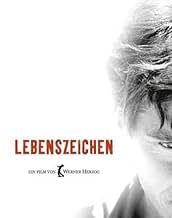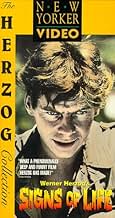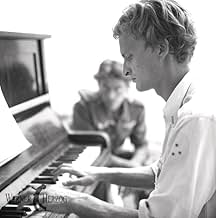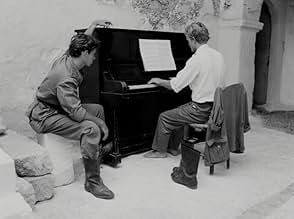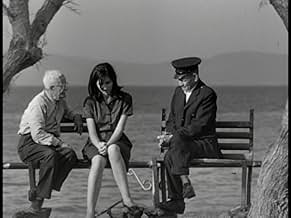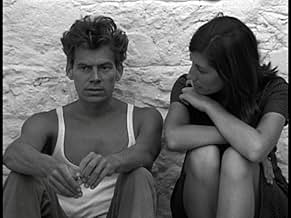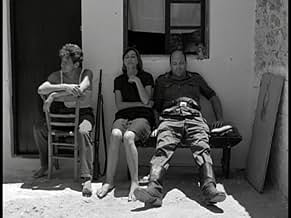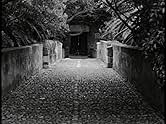CALIFICACIÓN DE IMDb
7.0/10
2.6 k
TU CALIFICACIÓN
Agrega una trama en tu idiomaThree wounded soldiers are removed from battle and given the task of looking after a fortress in a small coastal town. However, the pressures of isolation begin to take their toll on the men... Leer todoThree wounded soldiers are removed from battle and given the task of looking after a fortress in a small coastal town. However, the pressures of isolation begin to take their toll on the men.Three wounded soldiers are removed from battle and given the task of looking after a fortress in a small coastal town. However, the pressures of isolation begin to take their toll on the men.
- Dirección
- Guionistas
- Elenco
- Premios
- 2 premios ganados y 2 nominaciones en total
Werner Herzog
- Soldat
- (sin créditos)
- Dirección
- Guionistas
- Todo el elenco y el equipo
- Producción, taquilla y más en IMDbPro
Opiniones destacadas
Signs of Life is one of the purest cinematic experiences in the history of film. For those unused to slow moving, simple stories the movie will probably seem painfully dull. The first time I saw it I was nearly driven crazy by the pace. It was my first Herzog movie and I was unused to movies that operated outside the Hollywood formula. But that feeling of going crazy is exactly what Herzog is trying to bring you to understand. He gets inside the boredom of his principal characters so that you viscerally understand what they are going through. When one of them finally snaps -- you understand. The visual poetry of this film will live with me forever. Herzog more than any director alive understands that a picture is worth a thousand words.
Werner Herzog's debut feature tells the story of a wounded German paratrooper Stroszek (Peter Brogle) who is transported to the Greek island of Kos to recover physically and mentally. Already there are fellow soldiers Meinhard (Wolfgang Reichmann) and Becker (Wolfgang Von Ungern-Sterngberg), who are taking life easy in the sun with little to nothing to do. Stroszek sets them to work, but soon, as the work begins to dry up, he becomes more and more unstable in the isolation and loneliness.
Nobody really knows what goes through Herzog's head, but it is clear he is a film-making genius and has one of the finest eyes for visuals in cinema. Signs of Life explores themes that Herzog would later become engrossed and almost obsessed with - isolation, obsession and madness. While he would later employ Klaus Kinski as the face of wide-eyed insanity, here the tone is quiet, contemplative and often very funny. The opening half of the film concentrates mainly on the three soldiers trying to find things to do. Meinhard becomes frustrated with the presence of cockroaches in their apartment and builds a trap to catch them. The feeling of being trapped appears throughout the film, usually using animals - the soldiers are given a strange toy that seems to move on its own, until they open it and find out that it's full of trapped flies; and we are shown how a hen is hypnotised.
But the comedy is soon put aside as Stroszek begins his descent into madness, holding himself up in the 14th century fortress where the soldiers are stationed with a horde of ammunition. It's in the second half that Herzog shows us the images he can conjure. It's breathtaking what he achieves with a stolen 35mm camera and a micro-budget. Amongst other things, we see a seemingly endless field of windmills, and fireworks set off into the night sky. The grainy black-and-white imagery gives the whole thing a fresh beauty. This is far from the greatest debut in cinema, but a very clear indication of a director's raw skill, and of course, Herzog would go on to make many fine films.
www.the-wrath-of-blog.blogspot.com
Nobody really knows what goes through Herzog's head, but it is clear he is a film-making genius and has one of the finest eyes for visuals in cinema. Signs of Life explores themes that Herzog would later become engrossed and almost obsessed with - isolation, obsession and madness. While he would later employ Klaus Kinski as the face of wide-eyed insanity, here the tone is quiet, contemplative and often very funny. The opening half of the film concentrates mainly on the three soldiers trying to find things to do. Meinhard becomes frustrated with the presence of cockroaches in their apartment and builds a trap to catch them. The feeling of being trapped appears throughout the film, usually using animals - the soldiers are given a strange toy that seems to move on its own, until they open it and find out that it's full of trapped flies; and we are shown how a hen is hypnotised.
But the comedy is soon put aside as Stroszek begins his descent into madness, holding himself up in the 14th century fortress where the soldiers are stationed with a horde of ammunition. It's in the second half that Herzog shows us the images he can conjure. It's breathtaking what he achieves with a stolen 35mm camera and a micro-budget. Amongst other things, we see a seemingly endless field of windmills, and fireworks set off into the night sky. The grainy black-and-white imagery gives the whole thing a fresh beauty. This is far from the greatest debut in cinema, but a very clear indication of a director's raw skill, and of course, Herzog would go on to make many fine films.
www.the-wrath-of-blog.blogspot.com
A wounded German paratrooper named Stroszek (Peter Brogle) is sent to the quiet island of Kos with his wife Nora (Athina Zacharopoulou), a Greek nurse, and two other soldiers recovering from minor wounds.
The fortress which gives the film's main setting is a real 14th-century fortress built by the Knights Hospitaller. Herzog's grandfather, Rudolf Herzog, lived and worked for several years as an archaeologist at this site, and published translations of the ancient Greek engravings which appear in the film. The old Turkish man who appears in the film with a written translation was the last surviving worker from Rudolf Herzog's archaeological project.
I am not as crazy about Herzog as some people. Some of his movies I like, and I actually tend to prefer his documentaries. This film was alright and quite good for a first feature. I love the fact he took his father's work and translated it to a film. That is so cool to keep that connection. Somewhere I heard a rumor that this film influenced "The Shining". I don't see it... and I can't seem to be able to confirm it. How strange if true.
The fortress which gives the film's main setting is a real 14th-century fortress built by the Knights Hospitaller. Herzog's grandfather, Rudolf Herzog, lived and worked for several years as an archaeologist at this site, and published translations of the ancient Greek engravings which appear in the film. The old Turkish man who appears in the film with a written translation was the last surviving worker from Rudolf Herzog's archaeological project.
I am not as crazy about Herzog as some people. Some of his movies I like, and I actually tend to prefer his documentaries. This film was alright and quite good for a first feature. I love the fact he took his father's work and translated it to a film. That is so cool to keep that connection. Somewhere I heard a rumor that this film influenced "The Shining". I don't see it... and I can't seem to be able to confirm it. How strange if true.
10manjits
I first saw this film in 1969 in Bangalore (India) in a German film festival. The film was unheralded, being the first feature from an unknown director. However, the film made an everlasting impression on me, and I considered it among 2 or 3 of the best films I had seen till then. I kept track of Werner Herzog films ever since, and have been seeing them all I could lay my hands on. Even today, I'll put it as among the 10 best films I have ever seen, and it remains my favorite Herzog movie. The film is sheer poetry. It's a film about 3 characters'(2 soldiers and wife of one of them) boredom in an isolated Greek island, and how each one handles it. While one of the soldiers snaps up at the end, and tries to destroy everything in his impotent fury - managing only to kill a donkey ultimately - the second soldier keeps himself and first soldier's wife sane by just being raucously funny. I found the story, direction, camera-work and acting fascinating,and far from boring, as suggested by some reviews. I believe, Herzog has been influenced by India's Satyajit Ray in his style of presentation. He is one of the 3 most uncompromising film directors of the world in last 50 years, the other 2 being Ingmar Bergman and Robert Bresson, and his first feature is among his best.
I greatly admire Werner Herzog. While I have a long way to go in catching up on his films, all those I've seen to date - whether fiction or documentary - I've absolutely loved. It stands to reason, however, that not all a filmmaker's pictures will be equal, or equally appealing to a viewer. Despite myself, 'Signs of life' is the first of the man's features I've watched that just doesn't make a major impression with me. The filming locations are lovely, and I appreciate Thomas Mauch's cinematography. I regret to say that I don't particularly get anything else out of this; I altogether struggled to even stay awake while watching.
In terms of both content and film-making I recognize the underpinnings of the style, the command of the medium, that Herzog would develop and indeed perfect in very short order hereafter. Yet in this instance there is no meaningful plot or character development until the last third of the runtime. At that point 'Signs of life' is more actively engaging, more strongly holding of one's attention. Even then the story is a little light, though, and all that would have been necessary for the picture at large to have stood out more would have been for the progression of Stroszek's condition to have been earnestly drawn out over more of the preceding length. As it is, the shift comes across as too sudden in the narrative, and therefore less than natural, believable, or convincing.
I do like this film, and think it's worth watching, especially for Herzog fans. This is a showcase of where he was so early in his career, much as 'Dark Star' is for John Carpenter, 'Stereo' is for David Cronenberg, and so on. In much the same fashion, though, 'Signs of life' also lacks the finesse, and fullness of vision, that would let it truly shine, and by that token it's not necessarily so essential a viewing experience as are many if not most of those to follow. This is, still, a fine way to spend ninety minutes - only, much less than wholly perfect or captivating.
In terms of both content and film-making I recognize the underpinnings of the style, the command of the medium, that Herzog would develop and indeed perfect in very short order hereafter. Yet in this instance there is no meaningful plot or character development until the last third of the runtime. At that point 'Signs of life' is more actively engaging, more strongly holding of one's attention. Even then the story is a little light, though, and all that would have been necessary for the picture at large to have stood out more would have been for the progression of Stroszek's condition to have been earnestly drawn out over more of the preceding length. As it is, the shift comes across as too sudden in the narrative, and therefore less than natural, believable, or convincing.
I do like this film, and think it's worth watching, especially for Herzog fans. This is a showcase of where he was so early in his career, much as 'Dark Star' is for John Carpenter, 'Stereo' is for David Cronenberg, and so on. In much the same fashion, though, 'Signs of life' also lacks the finesse, and fullness of vision, that would let it truly shine, and by that token it's not necessarily so essential a viewing experience as are many if not most of those to follow. This is, still, a fine way to spend ninety minutes - only, much less than wholly perfect or captivating.
¿Sabías que…?
- TriviaWerner Herzog's first feature film. Often regarded as a pioneer of New German Cinema, his films often feature ambitious protagonists with impossible dreams, people with unusual talents in obscure fields, or individuals in conflict with nature. In 1961, when Herzog was 19, he started work on his first film Herakles. He has since produced, written, and directed over 60 films and documentaries. He has also published over 12 books of prose and directed many operas. French filmmaker François Truffaut once called Herzog "the most important film director alive." American film critic Roger Ebert said that Herzog "has never created a single film that is compromised, shameful, made for pragmatic reasons, or uninteresting. Even his failures are spectacular." He was named one of the world's 100 most influential people by Time in 2009.
- Citas
Young Child: Now that I can talk, what shall I say?
- ConexionesFeatured in Was ich bin, sind meine Filme (1978)
Selecciones populares
Inicia sesión para calificar y agrega a la lista de videos para obtener recomendaciones personalizadas
- How long is Signs of Life?Con tecnología de Alexa
Detalles
Taquilla
- Presupuesto
- DEM 25,000 (estimado)
- Tiempo de ejecución1 hora 30 minutos
- Color
- Mezcla de sonido
- Relación de aspecto
- 1.37 : 1
Contribuir a esta página
Sugiere una edición o agrega el contenido que falta

Principales brechas de datos
By what name was Lebenszeichen (1968) officially released in India in English?
Responda
